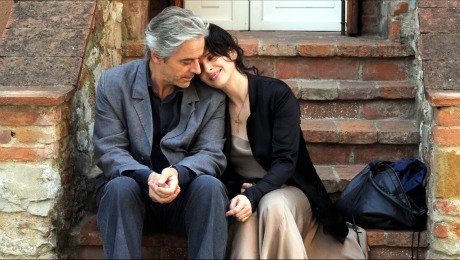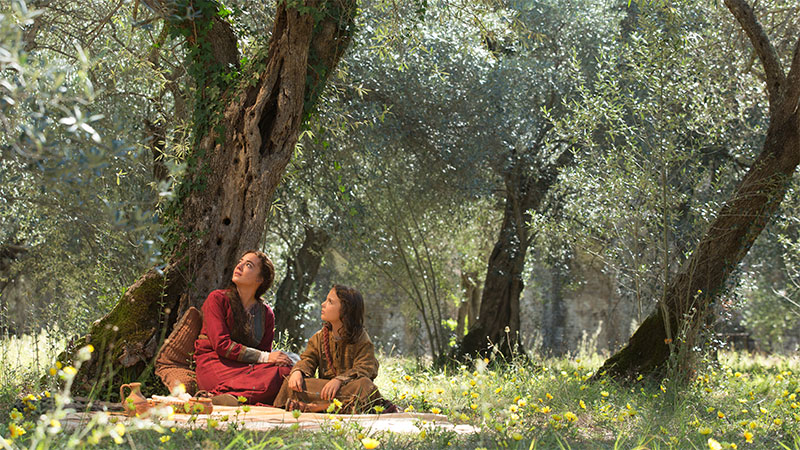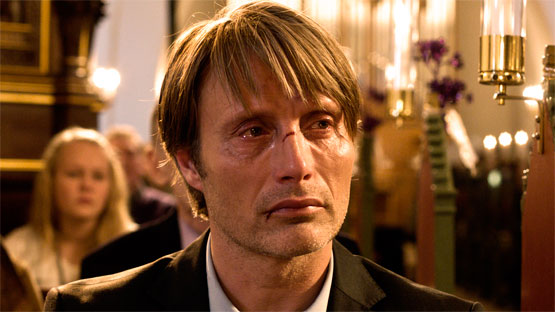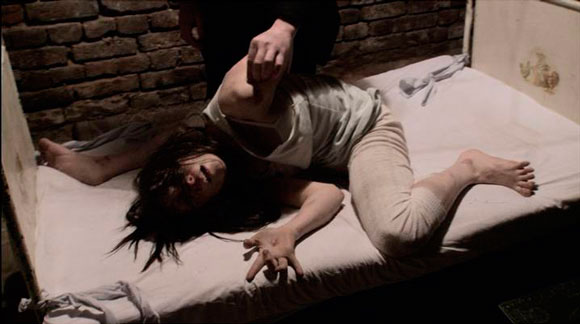Certified Copy is a film by Iranian writer and director Abbas Kiarostami, starring Juliette Binoche and the British opera singer William Shimell, in his first film role. The film is set in Tuscany, and focuses on a British writer and a French antiques dealer, whose relationship undergoes an odd transformation over the course of a day. The film was a French-majority production, with co-producers in Italy and Belgium. The dialogue is in French, English and Italian.
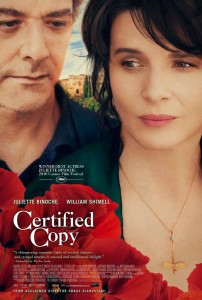
Certified Copy is about a middle-aged English writer, while in Tuscany to promote his latest book, meets a French woman who leads him to the village of Lucignano.
The film premiered at the 2010 Cannes Film Festival, where Binoche won the Best Actress Award for her performance. Critics have been mostly positive and have compared the film to several others, notably Roberto Rosselini’s 1954 film Journey to Italy.
British writer James Miller (Shimell) is in Tuscany to give a talk about his new book, also called “Certified Copy”, which argues that, in art, issues of authenticity are irrelevant, because every reproduction is itself an original and vice versa. A French antiques dealer, whose name is never given (Binoche), attends the talk with her 11-year-old son in order to have Miller sign the copies she has bought of the book, but has to leave early because her son is hungry. She drops off her phone number with Miller’s translator.
The film suffered from several delays and changes in the cast. Filming was originally supposed to start in October 2007 with English as the principal language. A second attempt was planned for March 2008, this time mainly in French and with Sami Frey opposite Binoche. Next up to be attached was François Cluzet, with filming scheduled to begin in May 2009. At some point Robert De Niro was in negotiation for the role, but eventually it was offered to William Shimell, a baritone opera singer who had never acted in a film before. Kiarostami had met Shimell in 2008 during his own debut as an opera director, an adaption of Così fan tutte for the Aix-en-Provence Festival, in which Shimell performed as Don Alfonso. “When I saw him, I immediately perceived in him the strength, finesse and humour of the character“, Kiarostami commented on his choice.
Production was led by MK2 in co-production with France 3 and the Italian company BiBi Films. Funding was granted by the CNC and via pre-sales to Canal+. The budget was 3.8 million euro.
The film was finally shot from 8 June 2009 on location in Tuscany, using locations in Cortona, Lucignano and Arezzo. Kiarostami is normally known for making films with amateur actors and almost no budget, but said he had no difficulties in making the transition to European cinema: “This was the simplest film for me to work on—even more simple than the work I’ve done on my shorts, because I was working with a professional team both in front of and behind the camera.” He also noted how he for once felt free to express whatever he wanted in the film.
Certified Copy premiered on 18 May 2010 at the 63rd Cannes Film Festival as part of the main competition. It was released the following day in regular French cinemas through MK2. The film opened in 101 venues and had an attendance of 70,876 the first week, resulting in a ninth place on the French box office chart. After the theatrical run’s second week, the number of screens had been increased to 147 and the film climbed one position on the chart, with a total attendance of 151,152. The French website AlloCiné reported a final total of 240,797 admissions.
During the release, the film was often billed as the director’s first film to be made outside his native Iran, but in reality it was only his first dramatic feature film to be shot abroad. It was preceded by the 2001 documentary ABC Africa and a segment in the 2005 anthology film Tickets. In Iran, the film was automatically banned by the Ministry of Culture and Islamic Guidance. Jamal Shourjeh from the ministry’s Cinematic Department explained: “Certified Copy has been produced by a non-Iranian in Italy in western culture; therefore, it should have a license for national screening“. Iran’s deputy culture minister Javad Shamaqdari later said that the film would remain banned from general screening, citing Juliette Binoche’s attire in the film as the main reason, but that it would be allowed to be shown “in some private circles and universities”.
Binoche received the Best Actress Award at the Cannes prize ceremony on 23 May 2010. The actress used her acceptance speech to bring attention to the Iranian director Jafar Panahi. Panahi had been set to be in the festival’s jury, but was held imprisoned by the Iranian regime during the event.

